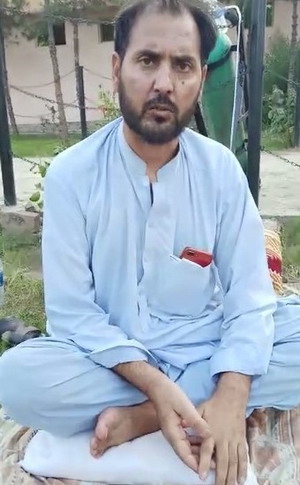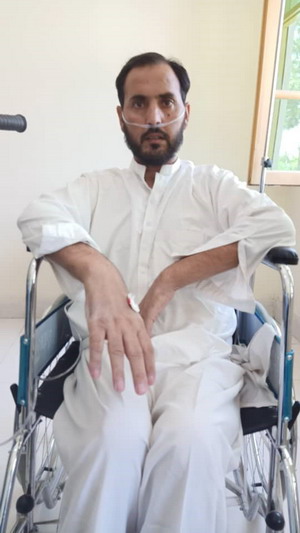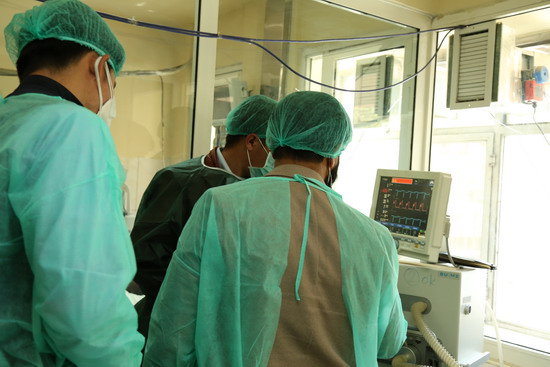“I have been there, and it is not easy”
 Muhammad HussainMuhammad Hussain, a 38-year-old resident of Barakhil village in Nazian District of Nangarhar province, sits at his home anxiously clutching his hands while recounting his experience of contracting and recovering from COVID-19.
Muhammad HussainMuhammad Hussain, a 38-year-old resident of Barakhil village in Nazian District of Nangarhar province, sits at his home anxiously clutching his hands while recounting his experience of contracting and recovering from COVID-19.
On 4 July, Hussain’s day began just like any other but within a few hours he found his body getting weaker. Shortly after, he noticed that he was starting to develop a fever, body aches and dry cough. His symptoms pointed to COVID-19 so he decided to stay home and monitor his condition. “It didn’t take long for my symptoms to become quite severe. My condition worsened very quickly and I started experiencing shortness of breath. My health continued to deteriorate fast from that point on,” recalled Hussain.
Hussain’s brother kept a close eye on him. “Fortunately, my brother had received extensive information on COVID-19 symptoms, and care through WHO’s Polio Surveillance Network, community-health workers and awareness campaigns to help him determine the right time to take me to the hospital for medical assistance,” said Hussain.
Seeking support to test, detect and isolate
Seeing Hussian’s condition considerably worsen within a matter of hours, his brother rushed him to the Jalalabad COVID-19 isolation ward, which hosts severe suspected and confirmed cases of COVID-19 to provide treatment and help contain the spread of infection. This ward has been set-up by the Ministry of Public Health with support from WHO, entailing training of health care staff and provision of essential medicines, supplies and personal protection equipment.
Once admitted, Hussain was visited by laboratory technicians from the Regional Reference Laboratory of Jalalabad for testing. Within a day and a half of taking the test samples, the laboratory confirmed that Hussain was positive for COVID-19.
“When the pandemic started, there was no COVID-19 testing capacity in Jalalabad or across Afghanistan. WHO, in collaboration with the Ministry of Public Health, swiftly mobilized to ensure availability of COVID-19 testing across the country by establishing laboratories and providing essential equipment and testing supplies. The COVID-19 testing laboratory in Jalalabad was inaugurated in the same week the first COVID-19 case in Nangarhar province was reported,” said David Lai, Officer In Charge, WHO Afghanistan.
To date, WHO has supported the Ministry in establishing and expanding 12 laboratories across the country together with ensuring continued provision of essential equipment and supplies, as per need. WHO further plans to facilitate the setup and operationalization of more laboratories in different provinces of Afghanistan to ensure increased capacity for testing, which is crucial for identifying, isolating and treating infected people to prevent the virus from spreading.
Bouncing back
 Although the vast majority of people infected with COVID-19 remain asymptomatic or experience mild symptoms, unfortunately for Hussain this was not the case. Within a few hours of being admitted to the isolation facility, his oxygen levels dropped dramatically, and his fever got worse, requiring the health care staff to move him to the ICU unit for strict clinical monitoring. Hussain was put on a ventilator to stabilize his condition and provided with supportive therapy under the supervision of Dr Shahid, who along with other health care professionals from the Jalalabad COVID-19 isolation ward had received training on infection prevention and control, ICU and case management. “This training helped us understand how to treat COVID-19 patients and manage the risk of infections to keep ourselves and everyone in the facility safe,” said Dr Shahid.
Although the vast majority of people infected with COVID-19 remain asymptomatic or experience mild symptoms, unfortunately for Hussain this was not the case. Within a few hours of being admitted to the isolation facility, his oxygen levels dropped dramatically, and his fever got worse, requiring the health care staff to move him to the ICU unit for strict clinical monitoring. Hussain was put on a ventilator to stabilize his condition and provided with supportive therapy under the supervision of Dr Shahid, who along with other health care professionals from the Jalalabad COVID-19 isolation ward had received training on infection prevention and control, ICU and case management. “This training helped us understand how to treat COVID-19 patients and manage the risk of infections to keep ourselves and everyone in the facility safe,” said Dr Shahid.
Continuous training of health care professionals remains a key need given the evolving nature of the pandemic. WHO is committed to facilitating such training to ensure health care staff are well equipped to respond to the current emergency and develop skills that will help them provide effective health care in future. To date, WHO in collaboration with the Ministry has trained 1823 health care professionals on ICU and case management and 1209 on infection prevention and control, across Afghanistan. Plans are underway to expand the training to reach more health care workers.

Having made a full recovery under the care of the medical staff at the Jalalabad COVID-19 isolation ward, Hussain was able to return home and regain his strength within a few weeks. He remains thankful to the health care staff who took care of him. “They put their patients’ lives before their own every day. It is an extremely tough job. I have seen the hard work they put in day and night and I remain eternally thankful to them for their dedication and for saving my life. We need to support them, and one simple way is to take preventative measures to avoid getting infected. COVID-19 is real. I have been there, and it is not easy,” said Hussain.
WHO is thankful to Afghanistan Humanitarian Fund (AHF), Central Emergency Response Fund (CERF), ECHO, Office of U.S. Foreign Disaster Assistance (OFDA) and the Government of Republic of Korea for providing funding to support WHO’s activities to strengthen the ongoing COVID-19 response.


